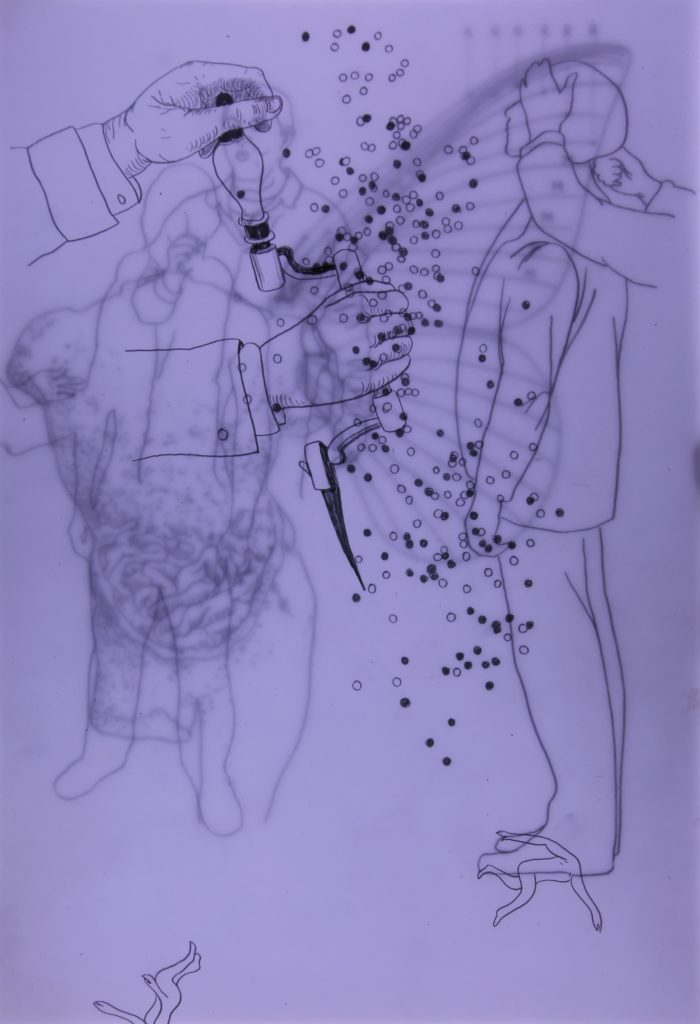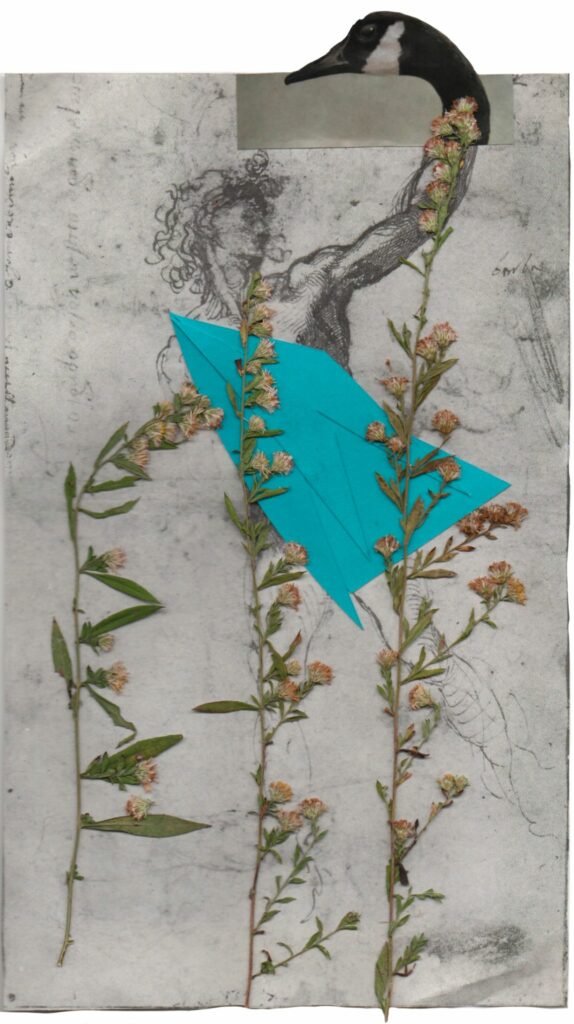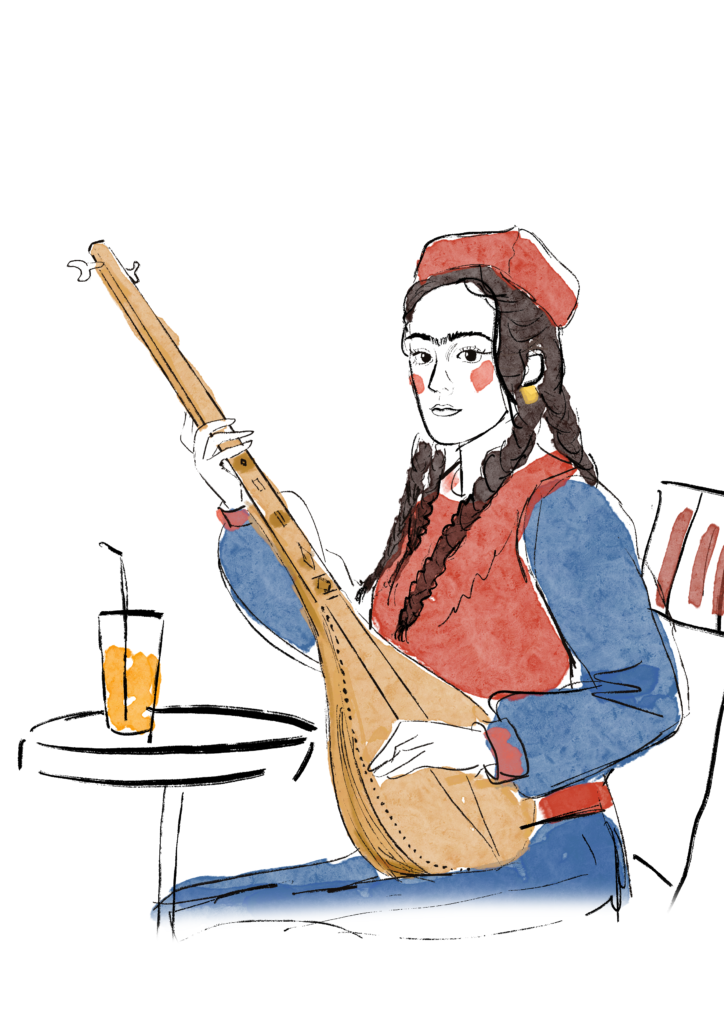‘Where was Mas Han? What was he running from? And why hadn’t he called or tried to get in contact with me? These were my questions, those of a wife, a woman, who had no idea how what had happened would affect the fate of the Indonesian people.’
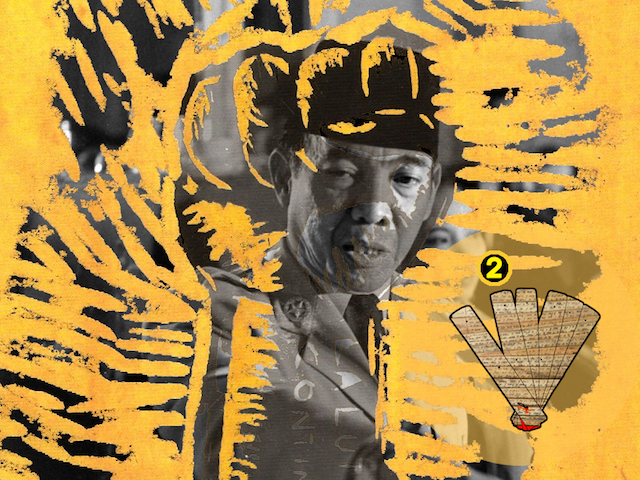
This is the second in a six-part series on literature in translation from Indonesia. Read the first, an interview with translator and founder of the Lontar Foundation, John McGlynn, here. And read about why Leila S. Chudori chose to write about Indonesian political exiles post-1965. And look out for more on The Margins in the coming months.
Series Introduction
This October, Indonesia is the guest of honor at the Frankfurt Book Fair, the first time a Southeast Asian nation has been chosen to showcase its culture at the largest and most important publishing event in the world. Indonesia’s slogan for this event, “17,000 Islands of Imagination,” evokes the commonplace of Indonesia as “an imagined nation,” and perhaps indicates that even the national organizing committee doesn’t know what keeps this country together. Inspired by Frankfurt, AAWW decided it was a perfect occasion to introduce a series on Indonesian literature in The Margins.
Our occasional series, spread out over six months, is designed to introduce some of Indonesia’s most gifted writers and give readers a flavor of an expansive literary tradition that weaves together cultures, histories, religions, languages, and myths.
On September 30, 1965, an attempted coup in Indonesia blamed on the Indonesian Communist Party led to one of the largest mass murders of the 20th century—up to one million Indonesians were killed and a million more were imprisoned. The history of this period has been grossly distorted. When Suharto came to power in 1967, his dictatorship, called the “New Order,” suppressed freedom of expression. The state insisted on their official version of history and identity, and the gruesome violence was all but erased.
Since Suharto’s overthrow in 1998, writers and poets have turned to what happened in 1965. In this month’s installment, we feature one such writer, Leila S. Chudori, whose work re-imagines and re-writes official history through fiction.
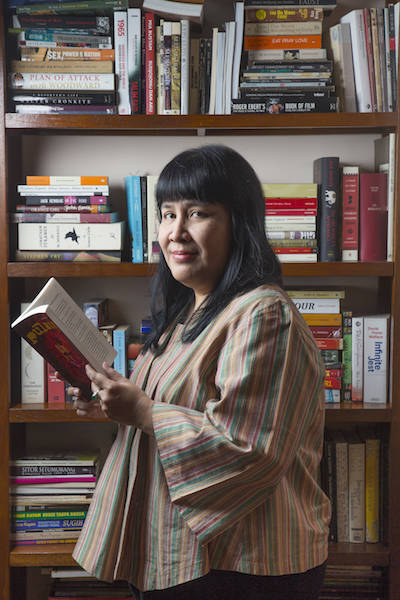
Born in 1962, Chudori is a prominent outspoken journalist and fiction writer based in Jakarta. Based on over six years of research, her novel Pulang or Home, translated by John McGlynn and published this fall by Deep Vellum Books, tells the story of two generations shaped by the events of 1965. Dimas Suryo survived the anti-communist massacre that spanned September 1965 into 1967 and fled as a political exile to Paris, never able to return. His daughter, Lintang Utara, returns to Indonesia just before Suharto’s fall in 1998 to fill in the gaps of what she knows of Indonesia, and to negotiate her relationship to Suharto’s New Order establishment.
“Home is not simply a story about ideology or political power,” writes translator John McGlynn of Chudori’s novel. “The novel is about the lives of Indonesian exiles, their families and friends, including those left behind in Indonesia. This story is one of love, lust, and betrayal but one that also includes laughter, adventure and lots of food.”
In the following excerpt from Home, we follow Lintang as she visits the Prawiro family in Jakarta, and interviews Tante Surti, her father’s first love, who experienced first-hand the horrific violence of 1965.
Also, read Leila S. Chudori’s account of what led her to write about this dark period in Indonesian history.
—Jyothi Natarajan and Margaret Scott
From Leila S. Chudori’s Home
Translated by John McGlynn
The Prawiro family home on Jalan Percetakan Negara in the Salemba area of Jakarta was an older building that looked in need of renovation. Its original white color was now closer to light brown. Even so, the small lawn and garden out front were well maintained, and the house was framed by lantana shrubs with showy heads of purple and yellow flowers. My video camera was in the carry bag hanging from my shoulder, and in my hand was a clear plastic container with strings of jasmine flowers. (Tante Retno insisted that putting them in the container would help to keep the flowers fresh.) The gate to Tante Surti’s home was unlocked and it creaked when I opened it. I looked around at the yard and imagined Kenanga, Bulan, and Alam who must have spent whole days playing there as children.
I knocked on the door. An older woman, a housemaid, I assumed, opened the door and invited me to come inside, then led me to the living room where she invited me to take a chair. The clackety-clack sound of a foot-driven pedal sewing machine came to me from a side room. Alam had told me that after her husband’s death, Tante Surti had supported herself and her family as a seamstress, and that she had two assistants to help with the sewing orders she received.
In the room were a long rattan recliner and a lazy chair that looked to be in need of retirement. Dozens of old and faded photographs in frames filled the bookshelf. A tall vase of white carnations perched on an Indies-style upright stand helped to freshen the room. A large photograph of the Hananto family hung on the living room wall. Om Hananto, still young and good looking, held a baby in his arms—Alam, for sure. Beside him were two girls: Kenanga and Bulan, of course. And standing next to them was—mon Dieu!— Tante Surti? It was no wonder that my father and Om Hananto had once vied for her attention. She looked like a film star the great filmmaker Usmar Ismail might have discovered. She wasn’t just pretty, with her thick wavy hair framing her oval face with almond-shaped eyes and finely shaped nose. She was stunning, with a magnetic appeal. Her full lips were a wonderfully natural shape—unlike those of many women today who manipulate their shape with lipstick around the edges to make them appear thinner or transforming thin lips to resemble hunks of steak, like Brigitte Bardot’s lips when she was young. No, Tante Surti’s lips were natural, perfectly formed, and required no disguise or manipulation. Like Maman, Tante Surti appeared to be a woman who did not depend on cosmetics to enhance her natural beauty. Maybe a light brush of the powder puff or a dab of lipstick on occasion, but that was enough. And certainly no rouge or mascara, either.
Hanging beside this formal photograph was another one that arrested my gaze: Alam dressed in some kind of martial art fighting gear—maybe karate, maybe taekwondo, I didn’t know the difference. He appeared to be of primary school age but even then, next to his teammates, he looked tall and fit for his age. A montage of photographs showed him in action and wearing a black belt. It must have been from those beginnings that he acquired the set of muscles visible beneath his shirt. Alam had his father’s face: handsome, stern, and masculine. Both Kenanga and Bulan were blessed with their mother’s beauty; but Kenanga, despite her obvious charms, did not smile in any of the photographs on display. She looked serious, almost forlorn. Her sister Bulan, on the other hand, was always posing and staring straight into the camera with a friendly smile.
“Hello. You must be Lintang.”
A woman of about sixty years of age stood in front of me: Surti Anandari, who was no less attractive in her later years than she had been as a young woman. What differentiated the present Surti from the one in the faded photograph was that her hair was now silver in color and her skin of a different texture. Nonetheless, for a woman who had suffered so much in life, she remained poised and erect. Alam must have gotten his eagle-like eyes from his mother, which had a piercing gleam.
I extended my hand and bowed slightly. She took my hand, embraced me warmly, and kissed my cheeks. Her eyes glistened as she stroked my hair.
“Such a beautiful daughter Dimas has,” she said, “Please have a seat. Would you like a refreshment?”
I sat down slowly on the sofa, still mesmerized by Tante Surti’s aura. She had a presence that filled the room. “Anything’s fine. Water would be OK.”
“I just split open a young coconut. Would you like some of that, with ice?”
Young coconut with ice on a hot day? A person would have to be crazy to object. Dingue! I nodded readily.
Tante Surti went into the kitchen and soon emerged with two bowls of young coconut with shaved ice and flavored syrup. The coconut tasted especially fresh, as if just cut from the tree. As we ate, we began our conversation, first seeking common ground: talking about my father’s friendship with Om Nug, Om Hananto, and Om Tjai when they were young; about going to school at the University of Indonesia at the time when Sukarno was president; and about the books they had difficulty in finding but which they usually managed to obtain from Dutch friends of Tante Surti’s father. After that, all the classic names emerged: Lord Byron, T.S. Eliot, on up to Walt Whitman and Allen Ginsberg and of course those Indonesian poets whose names were so common on the tongue such as Chairil Anwar and Rivai Apin. Tante Surti was able to quote these poets’ words, and did so with great warmth as she spoke. Her face became overcast, however, when she said that 1965 marked the end of poetry in her life, that at that time poetry had changed it into an alien thing.
“Ever since that time, the only thing I was ever able to think about was how to survive and to protect the children,” she said, looking at me as her mind returned to Jakarta today.
I felt it was time to begin to record what Tante Surti was telling me, but then her mood suddenly changed, becoming lighter. Smiling broadly, she announced that it was about time for lunch. Would I like to join? This was an offer I was not about to refuse. Alam was right.
“Kenanga called earlier to tell me that she’d cooked ikan pindang serani, and that she would send some over to me. It should be here soon,” Tante Surti said as she fetched silverware for the meal.
I helped her set the table as she told me that Kenanga lived with her husband and children nearby. Because Tante Surti now lived alone—her two assistants and the servant went home in the evening—Kenanga often cooked for her mother, even though, Tante Surti insisted, she liked to cook as well. Bulan, Tante Surti said, worked in an advertising agency on Jalan Rasuna Said and lived in a boarding house in the Setiabudi area, which was close to that street, in order to be close to her office. Tante Surti told me that regardless of how busy Alam was, he always visited her on weekends.
Strangely though, after all these years, she remarked with a glance in my direction, he had yet to bring a girlfriend home. Of her three children, Tante Surti said with a smile as she placed water glasses on the table, he was the only one who seemed to have no obvious intention of establishing a permanent relationship with anyone.
I didn’t know how I was supposed to react this information. Wasn’t it normal not to be married at the age of thirty-three? Or was it that in Indonesia the age of thirty or thereabouts was a demarcation line of sorts, past which one should not wait to get married? I was twenty-three and I didn’t know whether I wanted to get married or not.
I was answering one of Tante Surti’s questions when a lithe young woman who greatly resembled Tante Surti rushed breathlessly into the house holding a pot in her left arm, a tiffin in her right, and a plastic container beneath her chin. I quickly moved to assist and took the large and hot pot from her.
“You must be Kenanga,” I said. “Here, let me help.” I extracted the plastic container of fried shallots that was wedged between her chin and neck and then took the tiffin from her hand.
“Thank you,” she said, breathing a sigh of relief. “And you must be Lintang. My God, you’re beautiful!” she remarked point blank, causing me to blush straightaway. Tante Surti began to remove the food from the tiffin containers and put the various dishes in serving dishes. She shook her head and tisked. “My word, Kenanga, you cooked an entire meal!”
“No extra work, Ibu,” Kenanga replied. “It’s what we’re having at home for dinner tonight.” Saying that, she again looked at me, up and down, assessing my features. “I’m not surprised that Alam invited you here,” she said to me, then turned to look at her mother: “but I’m guessing that it wasn’t just for an interview!”
“I was thinking the same thing,” her mother replied. “Earlier, I told Lintang that Alam had never introduced any of his women friends to me. This is the first time.”
“You’re forgetting Rianti,” Kenanga said.
“Oh, Rianti…” Tante Surti said with a flap of her hands. “She only came here because Alam had suddenly vanished like a ghost and she knew that he usually visits me on weekends.”
I was strongly tempted to imitate the way Andini said “Ohmygod, ohmygod” whenever she found something to be funny or absurd, but secretly I didn’t object to this dialogue between mother and daughter since they had, at that instant, crowned me in my position as “the only girl Alam had ever invited to his mother’s home.” I didn’t know whether to scratch my head or to laugh, the situation was so absurd.
“I came to interview you,” I said to Tante Surti, “not because Alam suggested it.”
Tante Surti looked me in the eye, gently touched my cheek with her smooth fingers, and turned to Kenanga. “Look how she blushes!”
“It’s called the ‘Alam effect’,” Kenanga said with a laugh, as she came to the table with a pitcher of water.
Alam was right: when two women were talking, it was always best to listen and to not interrupt—especially when the two were as harmoniously paired as Tante Surti and Kenanga. He was also right that in his home, just as in mine, the family meal occupied an important position in daily life.
The three of us conversed while enjoying our plates of steamed white rice surrounded by tempeh cubes grilled in chili sauce, and stir-fried green beans with shrimp, and portions of milkfish from the soup that Kenanga prepared.
Kenanga seemed surprised to witness my dexterity in using the fingers of my right hand to eat the food she had prepared. When she pushed the bowl of rice towards me, a signal to help myself to a second serving, she asked, “Who taught you to eat with your fingers?”
“My father, of course,” I answered. “This pindang serani is extraordinary, Kenanga. The milkfish melts in your mouth. My father is the best cook at the Tanah Air Restaurant, and this is one of his favorite dishes.”
Kenanga glanced at her mother who was now enjoying the meal in silence.
“The recipe is from your father,” Kenanga said.
“Really?”
“Did you know that your father and my mother were once a hot couple?” Kenanga said.
I was glad she’d said that, as it indicated that she and her siblings could look on our parents’ former relationship with good humor.
“It’s a good thing they never married. If they had, you never would have met Alam!” Kenanga declared as she picked up some of the dishes and began carrying them to the kitchen.
Tante Surti smiled to see her daughter continue to tease me. I brushed off Kenanga’s remark.
“Is Alam going to be busy all day?” Tante Surti asked me.
“I think so.”
Kenanga quickly cleared the rest of the table and then prepared to leave. She apologized, saying that she had to attend a parent-teachers meeting at the school of her youngest daughter.
Kenanga gave her mother a kiss, and then I walked her to the door. Noticing the plastic container of jasmine flowers on the table in the living room, she paused and said, “For most people jasmine is a flower of death, but for my mother …” She pointed at Tante Surti who was preparing coffee for the two of us in the kitchen, “…jasmine is a flower of life.”
Her remark implied that she and her mother were so close that she was confidant to her mother’s past life. Kenanga leaned towards me, speaking in a lower voice: “I suppose that it’s because I came to know of death at a very early age, I am now very short-tempered with people who do not appreciate life. That’s also the reason I get angry at Alam when he puts himself close to danger. It was enough that we had to grow up without our father and without a normal social life.”
I put my hand on Kenanga’s arm. “I hope that you will let me interview you one day.”
“Take care of Ibu first. She’s the linchpin in our lives. We’ll find a chance to speak again,” she said, “but now I have to go.” She kissed my cheek, then left the house.
We drank our coffee on the back terrace of the house. Tante Surti now seemed to be ready to give her testimony. She positioned herself on a chair facing the camera, a sign that we could begin.
Before starting, I told Tante Surti that if at any point she began to feel uncomfortable, she was to tell me so, and I would stop the camera. But with only one question from me to start, she began speaking to the camera as if it were a long lost friend, someone she had waited for years to meet again….
“I decided to marry Hananto Prawiro in Jakarta in 1953 for reasons of love and conviction. Hananto was a responsible man and I knew that he would love and take care of his family. I knew little about his political aspirations or activities. He worked as a journalist at the Nusantara News Agency where he ran the foreign desk. I knew that, of course, but I knew little of his activities outside office hours. In the numerous times that I was interrogated during the three years that Hananto was on the run, it was always that information my interrogators wanted: what it is that Mas Hananto did, whether he was a member of LEKRA, what meetings he had ever attended; who was present at the meetings, and so on and so forth. These questions were asked repeatedly by different interrogators, and with different tones of voice…”
Tante Surti paused for a moment to take a breath and a sip of coffee.
“Perhaps you could tell me why they detained the entire family…” I said to her.
“It’s not true that they detained our entire family—or at least that hadn’t been their original intent. It was my fault that happened. It was just that, with Mas Hananto gone, the kids and I were all so afraid of being separated from each other. But let me go back a bit…
“It all began on the morning of October 2 when Mas Hananto left to go to the office. He said the situation there was very uncertain. He told me not to leave the house unless it was absolutely necessary. Or, if I didn’t feel safe, then I was to go to my parents’ home in Bogor. But because I had just been at my parents’ house for an extended period of time for an entirely different reason—ehem, let’s just say that we were having marital problems—I declined his suggestion. I had no inkling of how bad things were to come.
“When Mas Hananto left, he looked worried but he tried to act normal. He reminded me not to be late in feeding Alam. Alam was a fussy child, you see. I reassured him that I would continue breastfeeding Alam as long as possible. Obviously, we didn’t know that this would be our last meeting before the day Mas Han was executed a few years later.
“When Mas Han didn’t come home that night, I wasn’t overly worried and was quite sure that the next morning he would show up at the house complaining about all the unfinished work he had to do. But this time, the situation was different. This wasn’t a problem of meeting a deadline, that became clear. When the next day Mas Han still didn’t come home, I began to make calls. First I called his office, but no one picked up the line, then the homes of colleagues and friends. I decided I had to go to see for myself. I left Bulan and Alam with neighbors, a kind old couple who lived next door, and then went with Kenanga to the Nusantara News office. Mas Han wasn’t there. I wasn’t able to meet the editor-in-chief either, whom I was told also had stopped coming into the office.
“The following days, I was tense with worry and paranoia. I tried to be calm so that Kenanga and Bulan could continue to go to school—even though, more often than not, they came home early because they said that class had been ‘let out’. My mother called and begged me to bring the children to Bogor, all the while cursing Mas Hananto for being a man who thought nothing of his family’s safety. Hearing my mother criticize Mas Han like that, I became defensive and decided to remain at home in Jakarta.
“One night, about three weeks later, I received a visit from Kusno, a journalist who worked with Mas Hananto at Nusantara News. …I suppose your father must have known him as well. Anyway, he told me that the editor-in-chief, and a number of other agency employees had been detained. Others had been called in for interrogation, but then allowed to go home. Kusno was one of the latter.
“Kusno told me that coming to my home was risky for him. He quickly conveyed that Mas Han was being pursued by the military and that he was in hiding and could not be contacted but that he wanted me to know that it was urgent I take the children and go to my parents’ home. After telling me this, he immediately left, leaving me to wonder whether his message was real or not—which has been a source of anxiety in my life from then on. Where was Mas Han? Where could he hiding? And what was he running from? And why hadn’t he called or tried to get in contact with me, if only for a moment?
“These were my questions, those of a wife, a woman, who had no idea how what had happened would affect the fate of the Indonesian people—not only members of the Communist Party and their friends or colleagues, but anyone who sympathized with the goals of the Party or were involved in its affiliated organizations.
“A few days later, after Kusno’s visit, a number of men in civilian clothes came to the house to search through my husband’s belongings. They searched our bedroom and then went into the children’s room, which made Alam scream. They turned everything upside down, but wouldn’t say way they were looking for. They asked the same questions, again and again. Where is Hananto Prawiro? When did he disappear? What did he take with him? Where did he usually hide? Did I know that he had a mistress? Did I know where she lived?”
At this point Tante Surti stopped speaking. Her eyes glistened and her lips trembled with anger. I asked her if she would like to stop and take a break, but she insisted on finishing what she had to say, then and there.
“They didn’t take us in that night. That happened a few days later when a couple of them returned to the house and asked me to come to Guntur—the military detention center on Jalan Guntur—for interrogation. It was difficult for me to leave the children at home because my parents didn’t live in Jakarta. Naïve as I was, I took the children with me, assuming that they would let me go home after I answered their questions. And so it
was that all of us went to Guntur.”
The story Tante Surti then went on to tell about the family’s experience at Guntur was the same as the reports in the letters from her and Kenanga that I had found in my father’s apartment. She said that they had been allowed to go home, but then had been called in again for interrogation, this time at the detention center on Jalan Budi Kemuliaan. The difference in experience of reading those letters and this interview was that I was now hearing her speak, first-hand and in her own voice, one that had been suppressed for thirty-two years.
Throughout the course of the interview, Tante Surti was able to maintain a calm and even tone of voice, but when she started talking about Kenanga, who first witnessed torture at such a young age, her voice grew raw with emotion. She said, “I could face anything but that: the shouting at me, the lack of food, sleeping on a mat, and being interrogated day after day, but not that. I could not bear the thought of what they might do to my daughter.”
Despite the discomfort it might cause, I decided to pursue this avenue of conversation and asked Tante Surti about it indirectly: “During this time of unknowing, the three years in which you didn’t know what had happened to your husband, what would you say was the most difficult time for you?”
“The worst time for me was in the last year, before they captured Mas Hananto, when we were transferred to Budi Kemuliaan. I repeat again, I could endure whatever treatment they dished out to me. I did what they asked: I cooked, cleaned the latrines, ironed their clothing, even after being interrogated for hours on end. But the most fearful thing for me as a mother, something that made my soul want to jump out of my body, was a threat to my children’s safety.
“One morning, when we were still at the Budi Kemuliaan detention center, I found Kenanga in the hall, massaging the shoulders of one of the interrogators. It was a sight that made my heart shrink. She had such an innocent look on her face, not understanding the evil ways of the world.
“It was one thing if they asked Kenanga to clean up the blood in their torture chamber; but when they brought themselves into bodily contact with her—even if it was ‘only’ a shoulder massage—the blood rushed to my brain. Kenanga was fourteen years old: a girl on the brink of womanhood, entering puberty in a detention center.
“I looked at her, studying her features more carefully. After all this time at the detention center, her skin no longer had a healthy glow. Her eyes were red and she was thin as a rail. Even so, I could also see that she was an attractive young girl whose breasts were beginning to develop. I wanted to scream at the man and scratch his face. I don’t know how but I did somehow restrain myself—even as he and the others undressed Kenanga with their wicked stares.
“Seeing what was happening, I immediately called out for Kenanga to help me with the cooking. The officer nodded his consent and Kenanga went with me back to the kitchen; but then, not more than a few minutes later, one of the man’s lackeys came to tell me that I was wanted ‘in the middle room’. That was the term they used for the interrogation room.
“In this ‘middle room’ there was just a table and two chairs. And there was a long neon light overhead that kept flickering.
“When I went into the room I saw two officers there. The one was ‘R’—I won’t say his real name—but he was the interrogator I hated the most. The other was ‘A’, whose skin was as dark as his black eyes.
“Officer R was a man who never shouted. He never beat people, never ripped out fingernails or smashed toes with chair legs, never used electricity to extract information. At first, all of us women who were being held there in ‘temporary’ detention—that is what they called it—thought that R was more civilized, more humane, especially when compared to Officers A and T, and even more so Officer M, who rarely spoke but had a penchant for cracking the skulls of the male prisoners. It was later we discovered just how wrong we were. Officer R was a different breed of evil altogether….”
At this point I pressed the pause button on my camera. I didn’t know if I could bear to record what Tante Surti was about to reveal. I recalled the letter she had sent to my father, the one I read in his apartment. That night in Paris I couldn’t sleep. I stayed awake all night, staring at the ceiling and cursing my naiveté. I was foolish to think that I could ever be a documentary filmmaker: I couldn’t stand to see a broken heart.
Tante Surti looked at me and nodded. The focused glow of her eyes told me that she needed to continue to tell her dark tale.
“Officer M signaled for me to sit on the chair. So I did sit down, but he remained standing and then began shouting his questions. I tried to answer him, but I could hardly hear my own voice—which made him shout even louder and stick his big, dark, square-featured face into mine. He kept saying, ‘What? What? I can’t hear you!’ He shouted so loud his spittle covered my face. All I could say was I didn’t know. It was then that Officer R came up and pushed Officer M aside. He took out a white handkerchief and gave it to me so that I could wipe the spit off my face. As I was doing this, I saw him signal with his eyes for Officer M to leave the room. Maybe he was going to protect me, I thought for a moment. But that was not the case. This was just an introduction to the actual evil.”
I grew tense. My heart withered and I had a strong desire to stop the interview, then and there. Suddenly the cell phone I’d borrowed from Andini began to ring. It was Alam calling. I immediately pushed the off button, because Tante Surti was still telling her story.
“Officer R sat down in front of me. He asked me to unbutton the first two buttons of my blouse. Completely shocked, I had no intention of doing what he asked; but then he smiled, calmly stood, and came over to where I was sitting. When he began to fondle my breasts, I used my feet to push back my chair away from him. It made an awful shrieking sound. Officer R shook his head slowly, waved his index finger at me, and then undid the buttons of my blouse. After that, he went back to his chair. I felt so naked and so exposed, I couldn’t regain my composure.
“At first his questions were the same, the ones I’d never been able to answer. …I tell you, there were times when I was tempted to make up a story about where Mas Hananto was hiding, just to make them stop asking those same questions. But with them holding the three children as a weapon, I didn’t dare to act foolishly. So, as usual, I answered that I didn’t know.
“But then he asked me, ‘What is Hananto like in bed?’ and ‘What do you like to do?’ I was astonished. The man’s questions caught me off guard, and my mouth dropped opened in surprise. He repeated his question, all the while staring at my open blouse. He then unfastened his belt and unzipped his trousers. I was silent, despairing. Then he asked in a firmer voice—not shouting or swearing, but more firmly—‘What do you two do in bed?’—with a smile on his lips.
“When I still said nothing, Office R began to talk about Kenanga, how pretty and innocent she was; how kind she was to massage his shoulders; how she readily obeyed when he asked her to massage his shoulders; and how, with her now beginning to menstruate, she would very soon be a woman. Horrified to hear him speak of these things, I immediately began to answer his questions. I began to speak, making up things, telling him whatever he wanted to hear, just to have this hell end.
“It didn’t stop there or on that day. Thereafter, almost every other day, Officer M would call me into the middle room. Sometimes he just stood there, pointing down at the floor in front of his feet; but more often he sat, leaning back against his chair with his trousers undone, gesturing to tell me what to do. The man had made Kenanga a weapon.
….Please don’t ever ask me how much I regret ever having brought my children to that awful place.”
Tante Surti stopped speaking but remained sitting, perfectly erect and glaring at the camera, her eyes shining with anger and tears rolling from them down her cheeks. She was like a woman in a nineteenth-century painting, a woman of almost perfect beauty but whose eyes betrayed sadness and suffering.
I pushed the off button on my camera, then went to the table to get the container with the jasmine flowers I had brought for her. I opened the container and removed from it several strings of flower buds. Kneeling before Tante Surti, I slipped the strands into her hand. She leaned towards me, put her arms around me, and hugged me gently. I returned her embrace.
After some time, with neither of us saying a word, Tante Surti released me and sat back up. Obviously not wanting to dwell on the awful experiences of the past for too long, she took a tissue from the box on the end table and quickly wiped her face. The way she rubbed her eyes, she seemed to want to leave no sign of having cried.
“When I die, I do not want to cry,” she said. “I want to die calmly and happily, with my loved ones around me.”
This series has been made possible by the Lontar Foundation and the New York Southeast Asia Network



